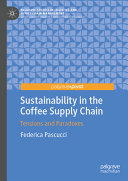

Most ebook files are in PDF format, so you can easily read them using various software such as Foxit Reader or directly on the Google Chrome browser.
Some ebook files are released by publishers in other formats such as .awz, .mobi, .epub, .fb2, etc. You may need to install specific software to read these formats on mobile/PC, such as Calibre.
Please read the tutorial at this link: https://ebookbell.com/faq
We offer FREE conversion to the popular formats you request; however, this may take some time. Therefore, right after payment, please email us, and we will try to provide the service as quickly as possible.
For some exceptional file formats or broken links (if any), please refrain from opening any disputes. Instead, email us first, and we will try to assist within a maximum of 6 hours.
EbookBell Team

4.3
68 reviewsFrom the field to the cup, this book investigates sustainability issues along the coffee supply chain, identifying the challenges that firms face when they are called to reach sustainability goals. In particular, it explores the relationships involving the actors throughout the broad coffee supply chain, among which some tensions may emerge. Firms increasingly need to interact with various supply chain members to achieve their sustainability goals and with a variety of other stakeholders as well, such as NGOs or regulators. Therefore, in order to fully investigate sustainability, it is fundamental to adopt a broader view of the supply chain that goes beyond dyadic relationships (typically, between customer and supplier).
This book adopts an “integrative logic” of sustainability and aims to explore the “hidden” or “dark side” of sustainable practices in the supply chain, for example, trade-offs, tensions and paradoxes. Overlooking these aspects can create serious impediments to a real-world progress toward sustainability. The empirical part of the book is focused on the coffee supply chain, which represents one of the most complex, globalized and inequitable supply chains, impacting communities and the environment worldwide. These characteristics make it particularly challenging for the industry to transition towards sustainability. Sustainability in the coffee sector is increasingly at risk in economic, social, and environmental terms, and there are several interdependencies among these three dimensions. The book will be of great interest to scholars and students of supply chain management, sustainability, and corporate and consumer responsibility. In addition, practitioners operating in the coffee industry could gain interesting findings about the most critical issues pertaining to sustainable practices and activities.